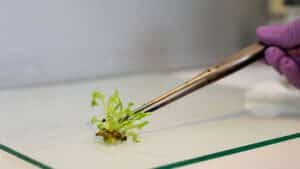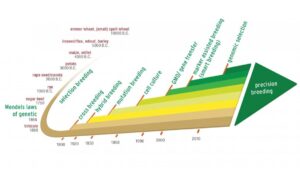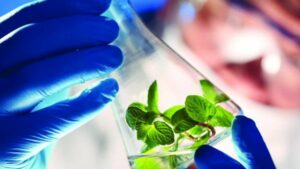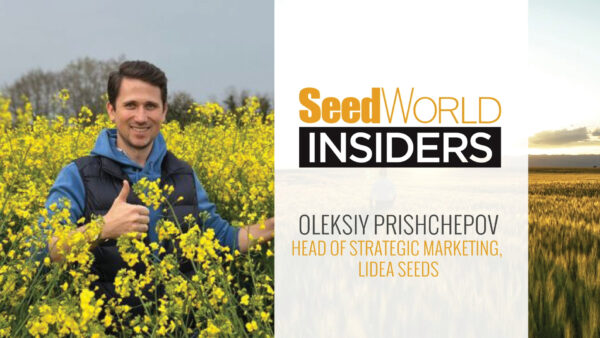Better solutions that meet new requirements are needed to feed a growing world.
From the viewpoint of our planet, our society, and even from the European continent, we are faced with a large amount of new requirements, or challenges, if you will. One needs only to mention climate change, increasing population, dwindling mineral reserves and fresh water shortage, and it becomes clear that life is different than it was 50 years ago.
As a result, most people would agree that there is a clear need to find and apply better solutions to deal with these requirements. More often than not, these solutions stem from innovation, which can be very simply defined as a “new idea, device, or method.” It is often accomplished through more-effective products, processes, services, technologies, or business models that are readily available to markets, governments and society.
The commercial seed and plant breeding sector started in the 1740s with the establishment of the earliest known seed company Vilmorin (1743) in France, and was followed by Tezier (1785), Groot (1813), Comstock (1829), Takii (1835) and several others. And since then, this sector has seen numerous ground-breaking innovations that have saved the lives of literally billions of people. For example: discovery of heterosis, plant cell culture, unravelling of DNA, quantitative genetics, disease resistant varieties, double haploids, male sterility, seed coating and priming, systemic plant protection products, marker assisted breeding, genetic transformation and many, many more.
The European seed sector continuously creates new plant varieties that are key to Europe’s agricultural productivity, sustainability and food security, and over the past two decades, several other ground-breaking innovations were added to the plant breeder’s toolbox, such as CRISPR-Cas, oligonucleotide directed mutagenesis (ODM) and many others. These techniques are improvements and refinements of traditional breeding methods and are used to optimize yield, plant health and nutritional quality. Let’s not forget that conventional plant breeding has a centuries-long history of delivering varieties that are safe for human and animal consumption.
Although we’re faced with the abovementioned challenges, and despite the fact that we are going to need all the help we can get in mitigating these huge challenges, there is still strong opposition to these new methods. Some groups in society may cry wolf and express their wish for pre-market regulations of the products that will be developed by these new methods. In my view, regulations, if they are at all needed, should be based on sound scientific principles, and at the same time be proportional to the degree to which the product is creating new potential risks to human health or the environment. These regulations should not just be triggered by the process used in the course of its development.
Let’s pause for a moment and look at how the EU itself plans on tackling the abovementioned problems. The EU commission has identified the main challenges for agriculture, forestry and food research by 2020 and among others, it wishes to improve production efficiency and cope with climate change, while ensuring sustainability and resilience; empowering rural areas and supporting policies and rural innovation; and develop a sustainable and competitive agri-food industry.
In addition, the EU pursues three objectives through its Common Agricultural Policy (CAP): securing viable food production; ensuring sustainable management of natural resources and climate action; and contributing to a balanced territorial development. The Commission adds: ‘delivering these objectives requires creating, sharing and implementing new knowledge, new technologies, new products and new ways to organise, learn or cooperate.’
Great! A clear openness to and awareness of the need for new technologies. We know that through plant breeding and with the help of the new methods, better plant varieties would be created faster and in a more efficient way. These varieties would have more resistance and higher quality for EU consumers. Resistant varieties mean less pressure on the environment in terms of crop protection products, so all lights should be green for these new breeding methods.
One other thing: in many fields such as plant breeders rights, seed testing or seed certification, the seed sector is experiencing a patchwork of national implementation of international regulations. This patchwork is creating trade barriers, additional time and costs, delays in delivery, decrease in quality and in some cases total loss of the product.
With regards to the new breeding methods, initial decisions towards regulatory guidance have already been taken in a few countries, discussions have only just started in others and many countries have not even started to address the matter yet. The fact that different legislation might regulate these methods in a different fashion is causing legal uncertainty. The new plant varieties derived from one method may be exempt from regulation in one country, whereas they need to be regulated in another country.
This legislative uncertainty is of great concern to plant breeders, and the overall seed trade. For all regulations applying to the seed sector, I urge governments to get together and work diligently towards an aligned approach. The current regulatory framework and especially it’s a-synchronicity pose a major concern to the European and global seed trade and overall food security.
I’d like to point out that Europe has been and still is at the forefront of many of these plant science innovations, but may (again) risk seeing the benefits exported to other parts of the world due to its overly cautious and innovation-unfriendly approach.
Let’s be crystal clear: no society can survive without innovation. Innovation is crucial to the continuing success of any group or organization. And more specifically, let us recognize the tremendous importance and the many achievements of innovation in plant breeding and continue to embrace it with open arms.
Marcel Bruins
editorial director, European Seed













